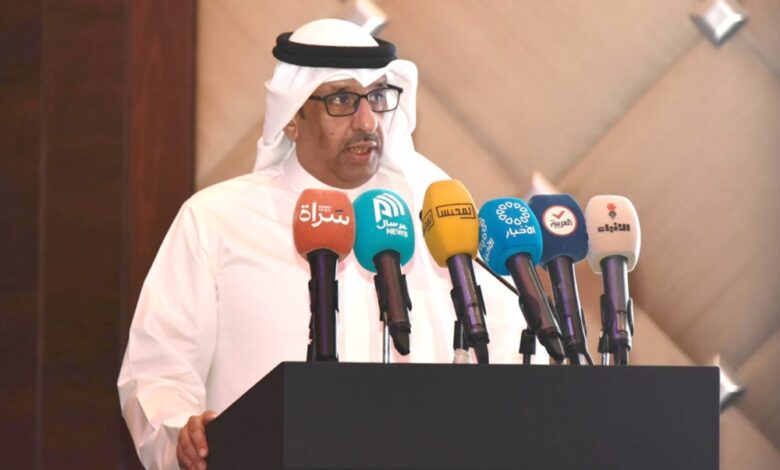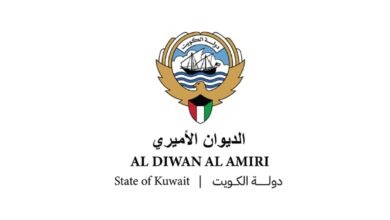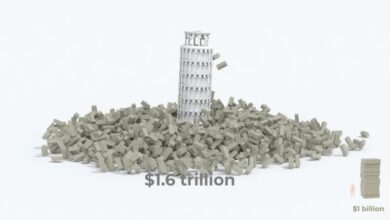Kuwait leads effort for unified Gulf strategy against money laundering
Jassim Al-Budaiwi, GCC Secretary-General, said that the anti-money laundering strategy is built on five pillars—legislation, joint security operations, advanced technology, tracking and confiscation of illicit funds, and training and awareness.

• Major General Ali Al-Adwani, the Acting Undersecretary of the Ministry of Interior, said Kuwait has made significant progress in developing legislation, regulatory systems, and regional and international cooperation to confront serious crimes.
• Jassim Al-Budaiwi stressed that money laundering threatens economic stability, fuels terrorism, organized crime, and global security, with laundered funds estimated at 2–5% of GDP, equating to $800 billion–$2 trillion worldwide.
Major General Ali Al-Adwani, the Acting Undersecretary of the Ministry of Interior, affirmed that Gulf Cooperation Council (GCC) countries are firmly committed to combating money laundering and terrorist financing, describing these acts as serious crimes that threaten societal security and stability and adversely affect national and regional economies. “We have made significant progress in developing legislation, regulatory systems, and regional and international cooperation in this field,” he said, Al Jarida newspaper reported.
Al-Adwani made these remarks during the opening of a workshop in Kuwait to prepare the Gulf strategy for combating money laundering. The event was held under the patronage of First Deputy Prime Minister and Minister of Interior Sheikh Fahad Al-Yousef and attended by GCC Secretary-General Jassim Al-Budaiwi and Attorney General Saad Al-Safran, along with representatives from several government agencies.
He emphasized that Kuwait attaches special importance to combating money laundering and terrorist financing. The government has developed legislative and regulatory frameworks, strengthened national institutions, and cooperated closely with international organizations to ensure compliance with global standards and the recommendations of international initiatives.
Al-Adwani explained that hosting the workshop in Kuwait reflects the country’s commitment to serving as a platform for dialogue and coordination among Gulf states and international partners. The goal is to develop a comprehensive Gulf strategy focused on prevention, detection, investigation, asset confiscation, training, and capacity building.
“It is our collective responsibility, as governments and institutions, to work together to strengthen the financial justice system and protect our economies and societies from cross-border crimes,” Al-Adwani said. He added, “We are pleased to host this important workshop, part of joint efforts with the United Nations Regional Office on Drugs and Crime to develop the Gulf strategy to combat money laundering.”
Amiri support
Al-Budaiwi expressed his gratitude to His Highness the Amir Sheikh Meshal Al-Ahmad Al-Jaber Al-Sabah for Kuwait hosting the forum and for the support provided to ensure the success of the Council’s work. He also acknowledged the continued backing from the GCC leaders in all fields.
Al-Budaiwi highlighted the global challenge of money laundering, noting its effects on economic stability, terrorism, organized crime, and international security. Estimates place the volume of laundered funds between two and five percent of global GDP, or $800 billion to $2 trillion.
Given their location, economic standing, and global openness, GCC countries are aware that any loophole in financial or regulatory systems could be exploited to channel illicit funds or finance destabilizing activities. Accordingly, the countries have enacted legislation aligned with international standards to deter such risks.
Al-Budaiwi concluded that a comprehensive Gulf security strategy is essential, emphasizing collective security and practical, effective measures. The 2024 GCC regional security vision underscores the importance of legislative systems to combat money laundering and terrorist financing.
Al-Budaiwi said the workshop marks a significant milestone in the GCC’s efforts to confront one of the most dangerous cross-border crimes, which threatens economic and financial security while impacting societal stability and the reputation of commercial and financial systems at regional and international levels.
He noted that adopting this strategy will strengthen Gulf security cooperation, enhance coordination with international partners, and develop a more robust and effective system to combat complex financial crimes.
Five key pillars
Al-Budaiwi outlined that the anti-money laundering strategy is built on five main pillars. The first focuses on developing supportive legislation and policies, enhancing the role of interior ministries in closing exploitable loopholes, and ensuring effective coordination with financial and regulatory authorities.
The second pillar emphasizes joint security operations and investigations, including the creation of Gulf task forces, integrated field operations to track criminal networks, and secure communication channels for exchanging sensitive information.
The third pillar centers on technology and security analysis, leveraging artificial intelligence, financial data analytics, and secure electronic connectivity to share information on financial crimes among interior ministries and relevant authorities.
The fourth pillar addresses tracking and confiscation, establishing mechanisms to monitor illicit funds linked to drug trafficking, corruption, terrorism, and human trafficking, implementing joint seizure and freezing operations, and enhancing international cooperation in asset recovery.
The fifth pillar focuses on training and awareness, through specialized programs for interior ministry officers, unified operational manuals, and awareness campaigns targeting high-risk sectors.
Unified policy
Judge Hatem Ali, Regional Director of the United Nations Office on Drugs and Crime (UNODC) for the Gulf States, said the UNODC is honored to collaborate with the GCC General Secretariat, under the patronage of First Deputy Prime Minister and Minister of Interior Sheikh Fahad Al-Yousef, to develop the first unified Gulf policy and strategy to combat money laundering and terrorist financing.
Ali said, “No one should underestimate the risks facing the Gulf states, given their status as an economic and commercial hub, a tourist destination, and a center for global economic transactions seeking to benefit from the region’s strong economy.”
He added that these advantages also expose the Gulf to threats from organized criminal groups seeking to exploit the thriving economy, its extensive trade networks, and active financial institutions to launder funds obtained from illicit trafficking, including drugs, weapons, and human trafficking.
Establishing safeguards reflect Gulf strategies
Ali noted that, under the guidance of GCC leaders, the General Secretariat has collaborated with the United Nations Office on Drugs and Crime to establish safeguards reflecting Gulf strategies. “We began with the first Gulf strategy to combat drugs and psychotropic substances last year,” he said.
“This year, we are building on shared Gulf experiences to confront terrorism financing, aligning them with international standards to unify Gulf practices, address the challenges of money laundering and terrorist financing, and create a cohesive strategic and legislative framework for the region.”
Exploiting technological development and economic openness
Hamed Al Zaabi, Secretary-General of the UAE’s National Committee for Anti-Money Laundering and Combating the Financing of Terrorism and Illegal Organizations, said that money laundering is no longer merely a traditional crime. It is a sophisticated, cross-border activity intertwined with organized crime and terrorist networks, directly affecting the integrity of financial systems and the reputation of countries and their economies.
Al Zaabi added that the crime exploits technological advancements and economic openness and is growing more complex with expanding financial markets and emerging tools such as virtual assets and digital currencies. Combating it requires coordinated efforts, clear strategies, and effective practical measures.
He noted that the United Arab Emirates has made significant progress by launching its 2024–2027 National Strategy to Combat Money Laundering, Terrorist Financing, and Financing of Proliferation, based on national risk assessments, lessons from mutual evaluations, and international commitments aligned with Financial Action Task Force (FATF) standards.













